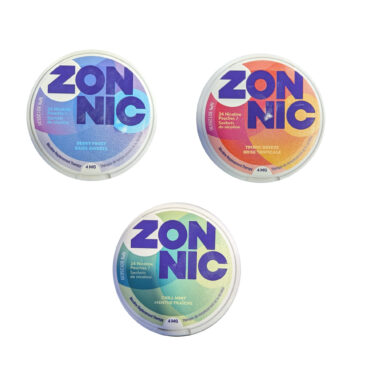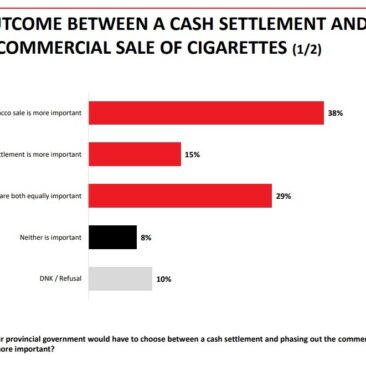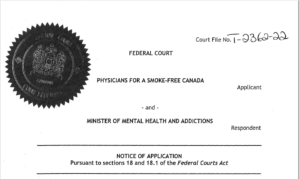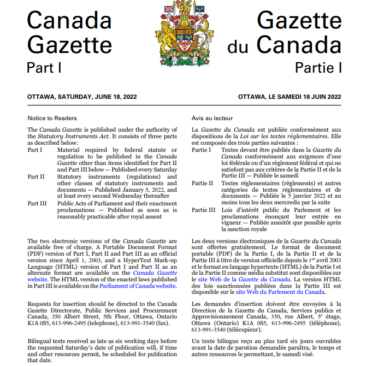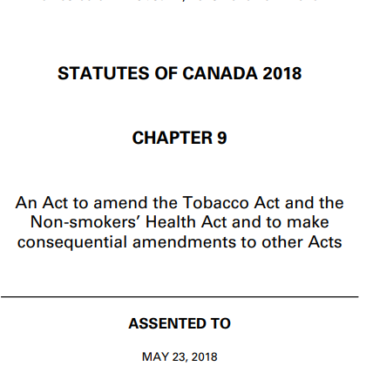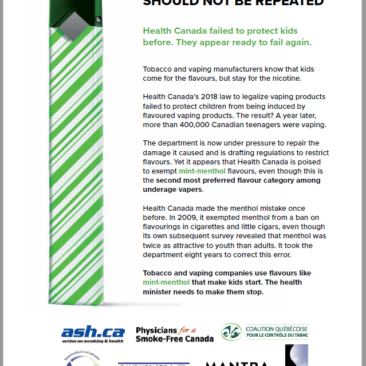Despite federal and provincial regulations, high-nicotine flavoured products with substandard warnings continue to be sold in convenience stores in Ontario. Whether they will be allowed to continue to do so is still not clear.
July 1: New rules come into force
At the beginning of July the rules for selling vaping products changed substantially in Canada’s largest province. As of that date:
- Convenience stores and most other retailers in Ontario are banned from selling vaping products with nicotine concentrations in excess of 20 mg/ml or with flavours other than tobacco. These products can only be legally sold in specialty vape shops.(Section 5 of Ontario Regulation 268/18).
- All manufacturers and retailers are obliged to ensure products conformed with new federal Vaping Products Labelling and Packaging Regulations. A highly visible component of these regulations is a requirement for minimum size of warnings (around 40% of the principal package surface).
And yet ….
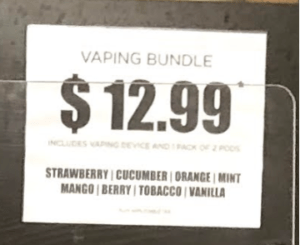
“Vaping bundle $12.99 Includes vaping device and pack of 2 pods. Strawberry / Cucumber / Orange / Mint / Mango / Berry / Tobacco / Vanilla”. Circle K sign, Ottawa, July 29, 2020
Thirty days after these regulations came into force, they appear to have had little effect in some of the convenience stores closest to Health Canada.
A visit to the three close branches of Canada’s largest convenience chain (Circle K) found that non-conforming products were not only available for sale, they were prominently advertised.
Each of the three large vaping manufacturers (British American Tobacco/Imperial Tobacco Canada; JUUL Labs; JTI-Macdonald) had non-conforming (illegal) products for sale.
- All three manufacturers were distributing products that contained more nicotine than is allowed for sale in Ontario convenience stores (almost 3 times the legal limit)
- All three manufacturers were distributing products that contained flavours that were not allowed for sale in Ontario convenience stores.
- Two of the manufacturers (JUUL, JTI) did not provide the legally-required warnings. Neither company appears to have changed its packaging, either in brick-and-mortar stores or on their retail web-sites.
Uncertainties about enforcement
In simpler times, regulations might have come into force on the date ordered by elected officials. Not so, it seems, with vaping regulations.
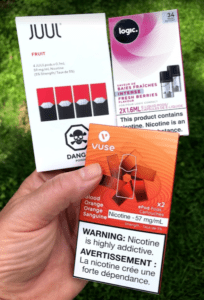 During the spring, Ontario convenience store associations which had opposed the regulations were seeking a delay in having to follow them. Among the reasons given were COVID-related difficulties, such as “the new normal of operating during the pandemic and the ongoing need for distancing.”
During the spring, Ontario convenience store associations which had opposed the regulations were seeking a delay in having to follow them. Among the reasons given were COVID-related difficulties, such as “the new normal of operating during the pandemic and the ongoing need for distancing.”
In early July, the convenience industry trade magazine Convenience Central reported that the lobbying efforts for a delay had been successful. Both federal and provincial enforcement officials were reported as having granted a grace period of six months. In the case of the Ontario government, ministry officials had agreed that “Providing more time to implement would allow owners and employees of affected businesses to practice physical distancing.”
Very soon afterwards, the provincial health ministry was somewhat walking back this assurance. As explained in a letter from the Ontario Ministry of Health to retailers, under the Smoke-Free Ontario Act (SFOA) the ministry does not have the authority to direct inspectors on whether or how to lay charges. “SFOA inspectors are provincial offences officers under the Provincial Offences Act and exercise independence in their approach to enforcing the SFOA, 2017.”‘
Meanwhile, Health Canada had dent its own letter to retailers on June 1. The regulations were coming into force as planned. There would be some gentleness in any enforcement actions, which would focus on guidance and information for the first six months before “progressive compliance” would start in the new year. Nonetheless, business operators were expected to follow the law. “Health Canada calls on the vaping product industry to take feasible actions to comply with existing and upcoming statutory and regulatory requirements that help protect young persons and nonusers of tobacco from exposure to and dependence on nicotine; raise public awareness of the health hazards of using vaping products; and protect the health and safety of Canadians.”
So there we have it. Not the get-out-of-jail-free card the retailers wanted. But with no obvious policing, some retailers at least have decided to defy the new laws.

